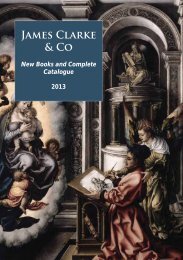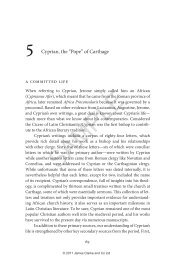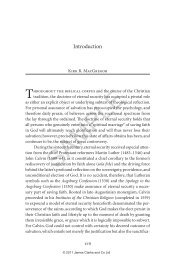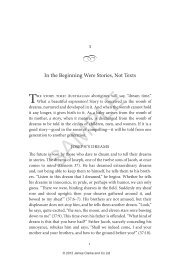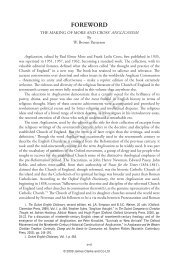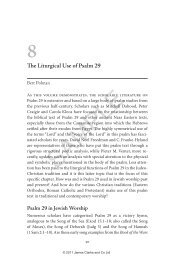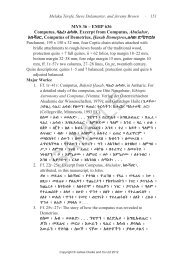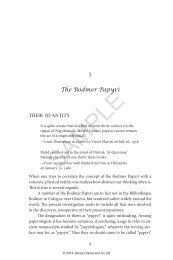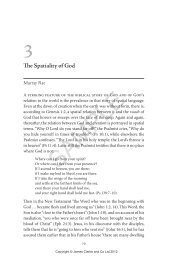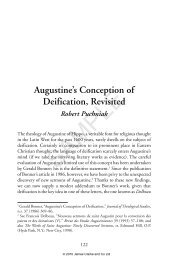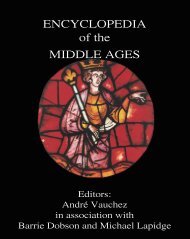Extract from Chapter 1 - James Clarke and Co Ltd
Extract from Chapter 1 - James Clarke and Co Ltd
Extract from Chapter 1 - James Clarke and Co Ltd
You also want an ePaper? Increase the reach of your titles
YUMPU automatically turns print PDFs into web optimized ePapers that Google loves.
62 MUSING WITH CONFUCIUS AND PAUL<br />
a moral perspective of yan, <strong>Co</strong>nfucius proposed the following categories<br />
of speech: deyan (virtuous speech), xinyan (trustworthy speech), weiyan<br />
(upright speech), shenyan (cautious speech), <strong>and</strong> yayan (correct speech).” 18<br />
All these locutions are related to the rhetor’s ethos. According to Oliver,<br />
<strong>Co</strong>nfucius gives seven distinct reasons for persuasive discourse:<br />
. . . ‘to communicate ideas clearly’ (Analects 15:39); to ‘captivate<br />
the will of those whose loyalty must be won’ (9:24); to maintain<br />
social functions, for as he said: ‘Human relations not rectified,<br />
speech would grate; speech grating, activities would not carry on’<br />
(13:3); to reform the conduct of a prince or friend, for ‘how can<br />
one help . . . rectifying, through persuasion, the one to whom he<br />
is loyal?’ (14:7); to win personal advancement, since experience<br />
shows that ‘Unless gifted with the artful tongue of Ceremony<br />
Master T’o <strong>and</strong> the h<strong>and</strong>someness of Prince Ts’ao of Sung, one<br />
can hardly get on these days’ (6:15); to gain a truer underst<strong>and</strong>ing<br />
of other people, since ‘he who does not know the value (force) of<br />
words will never come to underst<strong>and</strong> his fellow men’ (20:3); <strong>and</strong><br />
to represent clearly <strong>and</strong> accurately the true nature of the speaker,<br />
for ‘There are three facets of a gentleman. Looked at <strong>from</strong> a distance<br />
he seems stern; at close range he is pleasant; as we listen to<br />
his words, they are clear cut’ (19:9). 19<br />
<strong>Co</strong>nfucius is the master of language, his metaphorical speech invites<br />
his disciples then <strong>and</strong> his readers now to join him in creating an orderly<br />
moral world. That invitational style includes using contrasts <strong>and</strong> openended<br />
definitions (this sounds like an oxymoron, but it has a pedagogical<br />
purpose). For instance, it would be difficult for us to determine the precise<br />
definition of the following terms: ren, zhong, shu, li, xiao, junzi. For<br />
<strong>Co</strong>nfucius, effective teaching requires the creative definition of concepts,<br />
leaving them open for disciples to explore their derivative <strong>and</strong> connotative<br />
paths, <strong>and</strong> thereby to internalize them. Jay G. Williams gives the examples<br />
of how <strong>Chapter</strong>s (Books) I <strong>and</strong> II of the Analects are invitational<br />
in their discussion of the gentleman’s study <strong>and</strong> practice of ren.<br />
SAMPLE<br />
Initially, the connection between <strong>Chapter</strong> I <strong>and</strong> <strong>Chapter</strong> II seems<br />
unclear, though one has an inkling that the filial <strong>and</strong> the fraternal<br />
are old friends revisited. II.2, however, introduces the junzi once<br />
more. The true aristocrat, Lunyu’s ideal, is said to bend his atten-<br />
18. Lu, Rhetoric in Ancient China, 164. Yayan can be translated as “elegant speech.”<br />
19. Oliver, <strong>Co</strong>mmunication <strong>and</strong> Culture, 136.<br />
© 2008 <strong>James</strong> <strong>Clarke</strong> <strong>and</strong> <strong>Co</strong> <strong>Ltd</strong>



